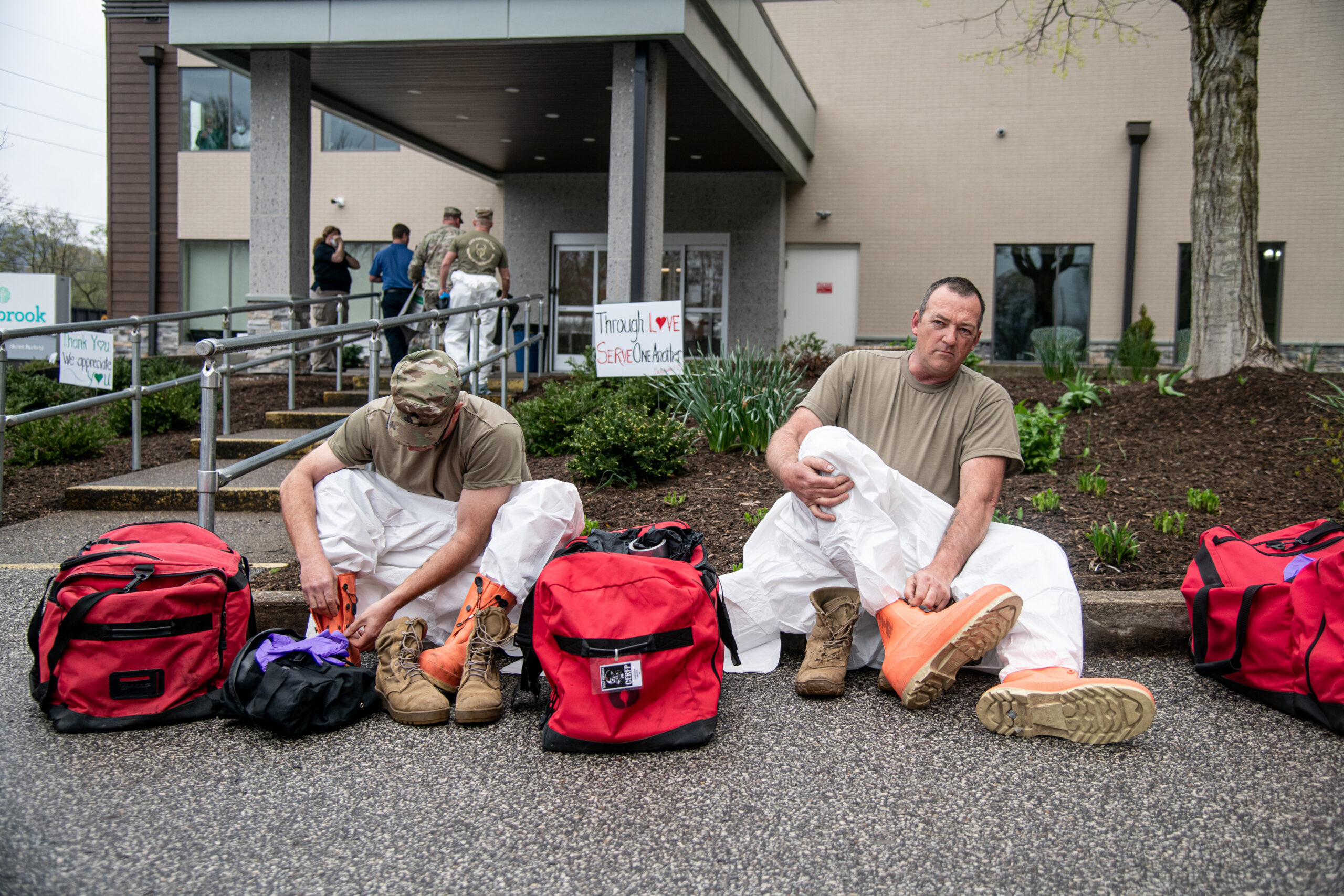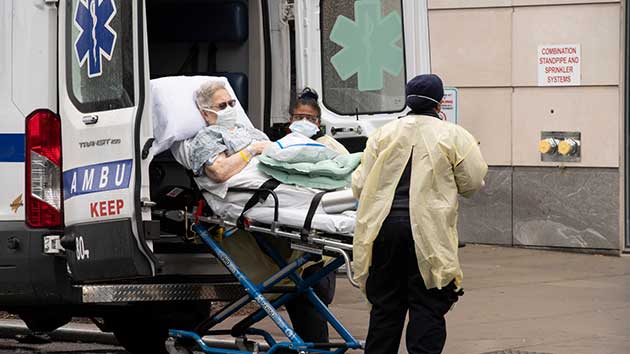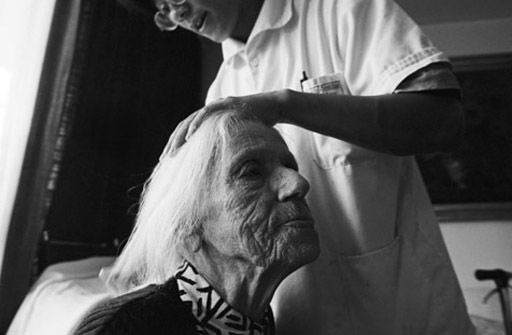Shortages of beds, staff and equipment made doctors discriminate against older persons and prioritize those younger, with more chances of survival, writes Isabel Ortiz.

Exhausted anesthesiologist in hospital, Pesaro, Italy, March 2020. (Alberto Giuliani, CC BY-SA 4.0, Wikimedia Commons)
By Isabel Ortiz
Inter Press Service
 Covid-19 is devastating on older persons. The numbers are staggering, more than 80 percent of the fatalities due to coronavirus in the U.S. and East Asia occurred among adults aged 65 and over. In Europe and Australia, the figures are even higher, 94 and 97 percent of the deaths were people aged 60 and over. However, when contagions spread, older people were denied access to beds and ventilators, despite being the most vulnerable group.
Covid-19 is devastating on older persons. The numbers are staggering, more than 80 percent of the fatalities due to coronavirus in the U.S. and East Asia occurred among adults aged 65 and over. In Europe and Australia, the figures are even higher, 94 and 97 percent of the deaths were people aged 60 and over. However, when contagions spread, older people were denied access to beds and ventilators, despite being the most vulnerable group.
Human rights experts were alarmed by the decisions made around the use of scarce medical resources in hospitals and intensive care units, discriminating solely based on age. Despite being helpless and most at risk, older persons were not prioritized; they were de facto sacrificed, denied treatment and emergency support.
“Older people have the same rights to life and heath as everyone else. Difficult decisions around life-saving medical care must respect the human rights and dignity of all,” stated the UN secretary-general, deeply concerned about events during the pandemic.
Silent Massacre in Care Homes

Members of West Virginia National Guard assist with testing for Covid-19 at a nursing home on April 6, 2020, Charleston, West Virginia. (U.S. Army, Edwin L. Wriston)
About half of the coronavirus casualties in high income countries were in care homes, though this is an underestimation because originally official death tolls did not include those who had died outside hospitals without a Covid-19 test done.
Most countries reported insufficient protective equipment and testing in care homes for both residents and care workers. Thousands were infected of coronavirus in nursing homes, and while some staff heroically worked in dangerous conditions, others did not. Staff absenteeism added to real horror stories.
For example, in a nursing home in France, 24 persons passed away in only five days; they died alone in their rooms of hypovolemic shock, without food or water, because 40 percent of the staff was absent. In Canada, a criminal investigation was launched after 31 residents were found dead, unfed and unchanged at a seniors’ residence; after other disturbing cases, the Canadian military had to be deployed to assist and the government is considering to take over all private long-term care institutions.
In Sweden, protocols discouraged care workers from sending older people to hospitals, letting them die in the care homes. In Spain, when the military were deployed to disinfect nursing homes, they were shocked to find people “completely abandoned or even dead in their beds.” Spain has launched criminal investigations into dozens of care homes after grieving relatives of thousands of elderly coronavirus victims claimed “our parents were left to die.”
Families Demand Justice

“Mobile morgue” outside a hospital in Hackensack, N.J., April 27, 2020. (Lawrence Purce, Flickr, CC0, Wikimedia Commons)
In Italy’s Lombardy region, a resolution offering 150 euros ($175) to care homes for accepting Covid-19 patients to ease the burden on hospital beds, accelerated the spread of the virus among health workers and residents. Coffins piled up in nursing homes. Families are filing lawsuits for mishandling the epidemic.
In the U.S., more than 38,000 older persons have died in residences because of Covid-19 and many families have filed lawsuits against nursing homes for wrongful death and gross negligence.
In the U.K., families of care home residents who died from Covid-19 are suing the Health and Social Care Secretary; the claims accuse the government of breaching the European Convention on Human Rights, National Health Service Act 2006 and the Equalities Act.
Industry Lobbying for Immunity

(UN Photo)
Long-term care is a lucrative and powerful industry. Europe’s care sector is concentrated in the hands of a few large private groups, often run by pension and investment funds. Also, in the U.S., 70 percent of the 15,000 nursing homes are run by for-profit companies; many have been bought and sold in recent years by private-equity firms.
In the U.S., nursing homes and long-term care operators have been lobbying state and federal legislators across the U.S. to pass laws giving them broad immunity, denying responsibility for conditions inside care homes during Covid-19. Nineteen states have recently enacted laws or gubernatorial executive orders granting nursing homes protection from civil liability in connection with Covid-19. Nobody is responsible for the suffering of thousands of older persons who died alone in care homes.
A Better Future

Out-patient elder care. (Andreas Bohnenstengel, CC BY-SA 3.0, Wikimedia Commons)
Due to the rapidly aging population, all countries should invest more in health and long-term care services for older persons.
Health-system capacity is strained by austerity cuts in earlier years. It was the shortage of beds, staff and equipment that made doctors discriminate against older persons and prioritize those younger, with more chances of survival to Covid-19. Governments and international financial institutions must stop mean budget cuts that have condemned many to die, and instead invest in universal public health and social protection systems.
Countries must also invest in quality long-term care services for older persons. Half the world’s elderly lacks access to long-term care. At the moment, governments spend very little on long-term care; instead, they have allowed private care services to develop, with minimal regulation. As a result, most older persons have to pay up to 100 percent of long-term care out of their own pocket and most cannot afford quality services — a highly unequal system.
Societies have failed older persons during the Covid-19 pandemic. Countries must redress this neglect and support survivors by properly regulating, inspecting and investing in quality care services for all older persons.
Isabel Ortiz is director of the Global Social Justice Program at the Initiative for Policy Dialogue at Columbia University in New York, former director of the International Labour Organization (ILO) and UNICEF, and former official of the Asian Development Bank and the United Nations.
This article is from Inter Press Service.
The views expressed are solely those of the author and may or may not reflect those of Consortium News.
Please Contribute to Consortium
News on its 25th Anniversary
Donate securely with  PayPal here.
PayPal here.
Or securely by credit card or check by clicking the red button:

If the American government is forced to do anything about the problem outlined, it will not give us “quality long-term care.” The plutocrats who own and run our government behind the curtain will never allow such a thing. See Caitlyn Johnstone’s latest essay at CN for the reasons. If they give us any sort of solution it will be mass euthanasia, since that is what’s best for them. We’ve all seen the movies. “Soylent Green” will probably be the archetype for our future eldercare problem, just like Orwell’s “1984” has been for 21st century governance in our transmogrified Western “democracies.”
Clearly some people are ageists and don’t and won’t admit to it. I feel ageism is more common than racism and many other isms. Decide for yourself.
Congratulations to Ms. Ortiz on a very important article addressing the flagrant harm and injustice visited on one of our most vulnerable populations.
In addition to the examples cited by Ms. Ortiz, the governors of various US states including New York, New Jersey, Pennsylvania and California required nursing homes to accept coronavirus patients, even though it was already clear that older persons with co-morbidities were at the greatest risk of dying from the virus. Apparently the same was also done under Boris Johnson in the UK, and as mentioned by another commentator, the leadership of Belgium and Sweden. These “leaders”, who have been responsible for what can only be described as mass murder, need to be held to full account, not just subjected to occasional, mild criticism.
This problem results from the current economic system, which exploits or discards vulnerable populations – the old and sick, on the one hand, or the unprotected young, on the other – as shown by the Epstein and other child sex scandals. Being old in America is great if one is wealthy or powerful – indeed our two Presidential candidates are septuagenarians – but if one is old and poor, or old and sick, the situation can be cruel indeed. As Ms. Ortiz points out, long-term care is basically pay-as-you-go, and the cost of long-term care in the USA is inordinately expensive and can be ruinous for anyone with a net worth under eight figures. It is statistically much more likely for older persons to become disabled and require long-term care, for example, by reason of a stroke, than to die. And, given the exorbitant cost of long-term care (generally on the order of $150,000 per year), the victim will pay until impoverished, at which time Medicaid can step in and cover some basic expenses. And most of the facilities are dismal or punitive.
The other commentators have provided good analysis of the problem – and michael888 makes the particularly interesting point that it may well be related to the lack of respect and appreciation of the aged in the West, specifically the USA, as opposed to Eastern cultures such as China, Japan, Vietnam etc., which honor their elders. This is reflected also in other areas, such as mandatory retirement ages.
If I qualify as an old guy at 62 years of age, I hope what I say resonates a bit. The method that health care providers triaged the stricken is *not* discrimination, nor is it racist. It *IS* rather, a damning indictment of the US (non) healthcare-for-profit scam system. People should be outraged that the US ‘system’ is not geared toward healthcare, but rather to put massive profits into the pockets of Health Management Organizations (HMO) CEOs.
Only the US and the UK needed to resort to ignoring the elderly in preference to the younger crowd due that neither country had the front line capability to deal with the pandemic. In the case of the UK, it’s socialized healthcare system is massively underfunded, whereas in the US, massive bucks exist but are siphoned off into the pockets of HMO CEO’s, lobbyists, and bought politicians.
In any health emergency, where the system is overwhelmed, triage – a protocol where the stricken are placed into three categories, those that will survive, those that might survive, and those who won’t survive, are prioritized for scarce medical assistance thusly – is the only way to rationally provide medical assistance. There are only so many hospital beds, only so many doctors and nurses, and only so much medicine to go around that it must be determined where these resources go to provide maximum effect.
No. It is not discriminatory. It is not racist. It is, though, greed. Greed that spurs public spending on wars and it’s toys instead of a quality healthcare system.
That is what you should truly be outraged about.
Added to my very long Liverpool Care Pathway thread.
There has been a problem with putting older patients onto end of life care programs/trajectories for decades how.
This program consists of:
– Denial of medical treatment
– Denial of food
– Denial of water
– Application of increased levels of sedation
It was there in the 1990s with dr. Jane Barton and the serial killer Howard Shipman.
However it was turned into a protocol in the 2000s, when a report from the Evercare Hospice and Palliative Care Unit in Minnetonka, MN, became the basis for the Liverpool Care Pathway.
Evercare was owned by Ovations (CEO: Simon Stevens). Ovations was owned by the United Health Group of Dollar Bill McGuire, where Simon Stevens was an Executive VP. Simon Stevens is no CEO of the UK’s National Health Service or NHS. For Royal protection, Simon Stevens is also a Trustee of the King’s Fund, founded by Queen Elizabeth II, and whose Patron is Prince Charles.
In the 2010s, this program was exported to many countries around the world, including The Netherlands, Belgium, Germany and more.
hXXps://twitter.com/MrK00001/status/1289206496199356416
I think that aggregate government spending on elderly where not that small, but once large companies dominate the care, it becomes care industry with similar consequences as with industrial husbandry. Competitiveness requires cutting corners.
For example, it can be good idea for a facility that cares for elderly is to have arrangements for infected individuals. While pandemics are rare, clusters of deadly pneumonias are not, etc. Those arrangements would add to the cost, however little, corporate efficiency requires that it should be avoided. The pay for personnel is minimized, that probably minimizes their qualifications. Improvising care for infected people is hard if there is no protective equipment on premises, and no prior training how to do it (I would not know, but doing anything in protective gear is hard and frustrating). Then isolation can be psychologically detrimental, monitoring is hard but necessary etc. Low pay also forces them to have multiple jobs. An NYC example was alternating shifts as a taxi/Uber driver and in a facility that cares for elderly, “efficiently” transmitting from infected travelers to himself and than to everybody else in the facility.
Of course, if staffing is minimized (even if under-paid, it adds to the bottom line), it is hard cope with workers getting infected or quarantined because of an infection in the family.
I mentioned animal husbandry because I was very impressed by an article about the impact of cage size on the efficiency of poultry production. Smaller cages allowed in USA lead to smaller amount of feed per pound of meat, ideally, chicken should not move at all, but otherwise, the smaller cage, the more cruel but also cheaper. The differences are not big, but a corporation will not decide “why bother saving a penny per pound”, or a dollar per person under care.
I’ve wondered how much of Asia’s success with covid-19 is due with their respect and appreciation of the elderly (probably mostly due to border control with only a trickle of cases coming in, and testing, tracking and quarantining those as standard Public Health protocol).
In the US, while MSM crows about a state going above 200 deaths in a day, about 1500 people die in nursing homes daily, in a normal year, about 20-25% of all deaths in the US. The median stay is just over three years; everyone is eager that they die (they are getting pensions and spending money they worked for their whole lives which could be going to CEOs or feeding the maw of the stock market).
From the very start it was clear that covid-19 is a disease of the elderly, as affirmed in this article. Sweden, without lockdowns and masks, made its biggest mistakes with nursing homes (as did Belgium, and, on an expanded scale, NY state). The Swedes say they needed staff living on site, quarantined with the patients, with levels of protection between the general patient population and anyone who came down with covid-19, preferably moved to a separate facility or at least a dedicated ward. While the Chinese threw “the kitchen sink” at the disease, looking for silver bullets, and publishing on glucocorticoid efficacy in March months before that treatment was “discovered” by the Brits, with clotting treated with heparin, tPA and even aspirin , a desperate need for a prophylactic treatment of health workers and the elderly was ignored, or worse, politicized like hydroxychloroquine (which has to be given weeks before exposure to malaria, it’s useless in diseased people, yet all major trials were conducted in hospitalized and even ventilated patients. India is using HCQ widely, and SOME find it effective pre-exposure, mostly on health care workers). Similarly ivermectin and famotidine were being tried, and emphasis placed by many on nutrients and vitamins (such as vitamin D3, magnesium, zinc and selenium, often deficient in the elderly). Unfortunately the pandemic is being controlled by Dr. Fauci and the WHO, whose advice has been retracted repeatedly, and was essentially ignored by Asian countries, who had great success with their own Public Health protocols.